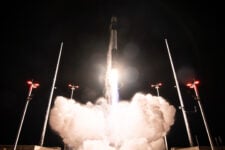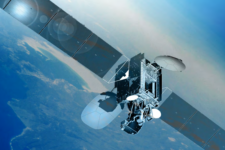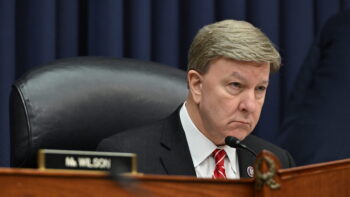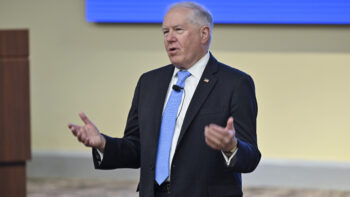
French Defence Minister Florence Parly in a 2019 photo. (Tracey Nearmy/Getty Images)
WASHINGTON: NATO’s long-awaited space policy calls on allies to voluntarily ensure compatibility among their national space assets, while pledging members to develop collective requirements and the means of fulfilling them — including the use of commercial capabilities.
Released Monday with little fanfare, the policy states that “NATO will identify and, if necessary, develop appropriate mechanisms, based on voluntary participation, to fulfill and sustain requirements for space support in NATO operations, missions and other activities in the above functional areas. Allies’ capabilities, and, if necessary, trusted commercial service providers should be leveraged to meet these requirements in the most secure, efficient, effective and transparent manner.”
It lays out four key roles for NATO in space:
- “Integrating space” into NATO’s core tasks;
- “Serving as a forum for political-military consultations and information sharing” on “threats, challenges, vulnerabilities and opportunities,” as well as the development of “legal” and behavioral norms;
- “Ensuring effective provision of space support and effects to the Alliance’s operations, missions and other activities;
- “Facilitating the development of compatibility and interoperability between Allies’ space services, products and capabilities.”
To that end, the allies have committed to a number of activities across nine “lines of effort” that include: space support; space domain awareness, “deterrence, defense and resilience,” and capability development and interoperability. The allies are also committed to joint training on space issues.
The policy stresses that NATO has no interest in developing its own collective space capabilities or in becoming an “autonomous space actor.” Instead, the 30 members “will undertake to provide, on a voluntary basis and in accordance with national laws, regulations and policies, the space data, products, services or effects that could be required for the Alliance’s operations, missions, and other activities.”
The allies consistently have kept space capabilities firmly on sovereign ground, and traditionally often have been reluctant to share information. The fact that it has taken this long to roll out of the public version of the policy — a first framework document was signed in June 2019 — is a testament to the culture of secrecy that has been even more pervasive in Europe than in the US (and that is saying something).
One reason for allied reluctance to engage on military space issues in public is that, with the exception of France and the United Kingdom, many European countries traditionally have been either deeply uncomfortable with, or downright opposed to, the concept of warfighting in space — especially offensive action. Indeed, in an August 2019 speech, NATO Secretary General Jens Stoltenberg found it necessary to declare that NATO’s declaration of space as an allied operational domain was “not about the militarization of space.”
The public policy released today makes no such caveat, but does signal that there remains some cracks between the allies on military uses of space.
For example, the policy explains that the North Atlantic Council — NATO’s decision-making body that at its highest level involves heads of state — will need to approve any options “across the conflict spectrum to deter and defend against threats to or attacks on Allies’ space systems.” It adds that in the meantime, allies “should develop a common understanding of concepts such as the role of space in crisis or conflict.”
European Union countries are holding their own annual high-level space conference next week that will include several sessions on defense-related issues, as well as a keynote by French Defense Minister Florence Parly.
France now holds the rotating office of EU president. At a meeting of EU defense ministers Jan. 12-13, Parly called for the development of a European strategy for space “security and defense” as part of the so-called Strategic Compass effort the 27 EU members launched in 2020 aimed at crafting a stronger, European defense policy independent of the United States — which a number of European leaders now see as an unstable ally. In recent years, Parly’s boss, French President Emmanuel Macron, has taken several potshots at NATO and is viewed in some circles as pushing for the EU to wrest influence away from the alliance.
“The adoption of the ambitious, concrete Strategic Compass is a top priority for the French Presidency of the Council of the EU in terms of defence, and a contribution to the development of European sovereignty,” the French government said in a press release following the defense ministers meeting.
Space Force EW unit working to integrate new weapon systems, intel personnel
The Space Force’s Delta 3 is responsible for organizing, training and equipping Guardians for electronic warfare missions involving satellite communications, as well as sustaining related offensive and defensive EW systems.


























